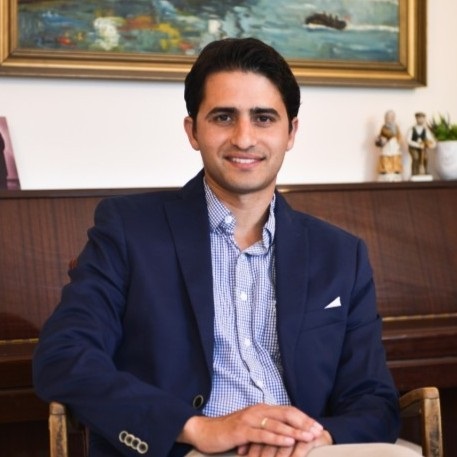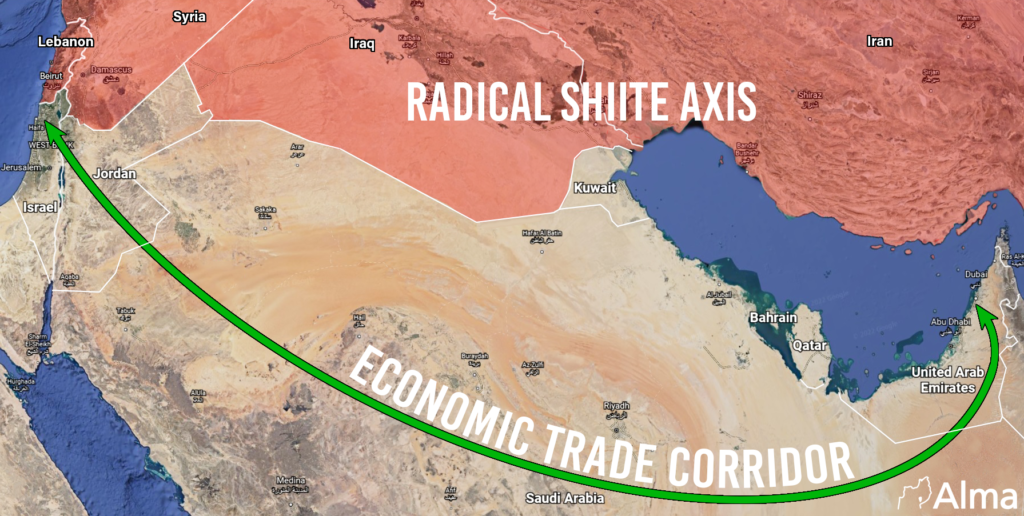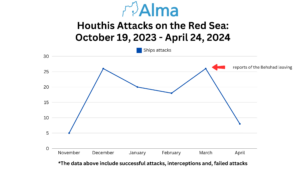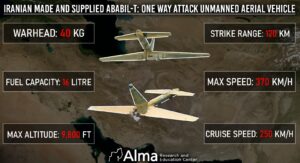By: Dr. Nir Levitan
The constant instability on the northern border, normalization agreements, and energetic cooperation push for a vital and necessary change between Israel and the Gulf states. A change that will strengthen stability and maintain a secure area.
Geopolitical changes through a series of trade agreements are accompanied by efforts to curb Iranian influence and change the middle east trade routes. One of the key changes is strengthening the land trade corridor between the Gulf states and Israel through Jordan.
Israel’s interest and main efforts focus on strengthening the land trade corridor connecting the Gulf states to Israel through the border crossing between Israel and Jordan. Some of it is done through the Valley Railway from the Beit She’an area to Haifa Bay. This infrastructure also enables the transport of goods to Europe while promoting Israeli interests with the Gulf states, sequentially curbing Iranian influence. The change began to gain momentum with the signing of the Abraham Accords when the UAE became the first Gulf state to normalize ties with Israel and advance a series of deals with the State of Israel.
Approximately $200 million in commodities are transferred from the Gulf states to Israel through the Jordanian free zones, where goods are entered and re-exported without the intervention of customs authorities. Throughout the previous decade (before the signing of the Abraham Accords), trucking traffic that extended from the Jordan River terminal near Beit She’an to Haifa Bay crossed the threshold of an average of 1,000 trucks per month. The trucks entered Israel from Jordan through the Jordan River border crossing (Sheikh Hussein), driving directly to Haifa port along a route of about 80 km. The volume of trucks, mostly transporting goods from Israel to Jordan and from there to various destinations in the Gulf states, suggest an average amount of hundreds of trucks a month on this route in the opposite direction. After the Abraham Accords were signed, according to data provided by customs authorities, the high scope of trade between Israel and the Gulf states dramatically increased the volume of trucks, indicating that the Economic Trade Corridor also increased the number of trucks moving along the route.
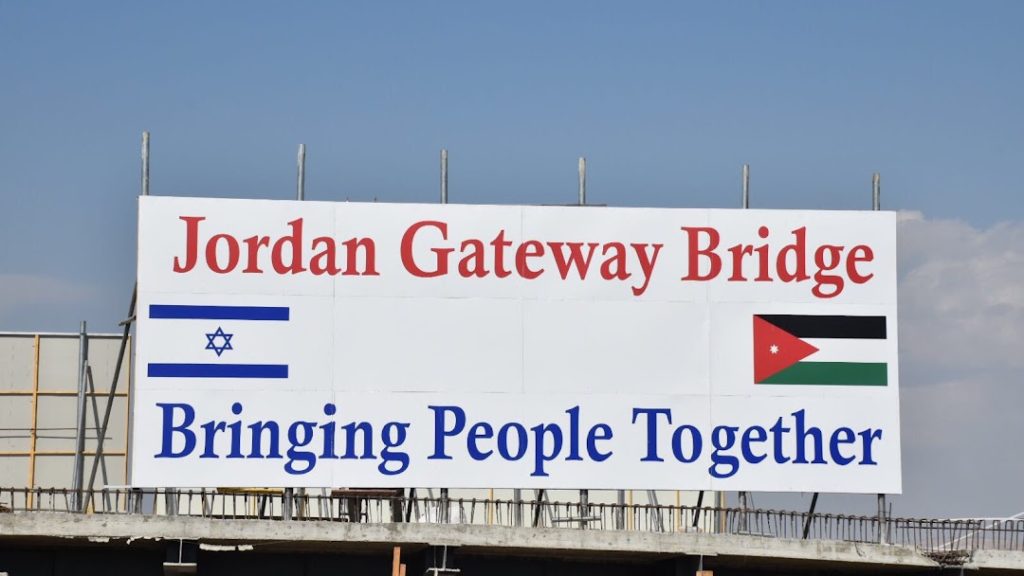
A potentially central location is the ‘Jordan Gate’ industrial zone that has been defined as a Qualifying Industrial Zone with direct American support. The industrial zone is located close to the Beit She’an area and constitutes a logistical backbone and a base for transporting goods to Israeli ports and from there to Europe. Part of the common vision is to create future trade routes of energy and commodity sources from the Gulf states through the trade zone and export from Port of Haifa.
Alongside the above, communications infrastructure is also changing the Middle East, and recently an Israeli telecommunications company signed an agreement to lay fiber optics that will connect the Far East and Gulf states through the Allenby Bridge crossing to Europe. The land and sea cables coming from the Far East will have two access points into Israel via Jordan: Eilat and the Allenby Bridge (King Hussein’s Crossing).
These changes incorporate the ability to accelerate economic processes in favor of a regional change, especially those that will curb Iran’s domination attempts on neighboring countries. Recently, Iran’s ambassador to Syria stressed the importance of economic and trade cooperation between the two countries. The Iranian transport minister, who visited Iraq at the end of December 2021, also discussed the expansion of cooperation between the two countries with senior Iraqi government officials. During the visit, the minister signed a memorandum of understanding to construct a railway project from western Iran to Basra in southern Iraq. The purpose of the plan is to strengthen the continental corridor between Iran and Iraq, Syria and Lebanon. At another meeting held in December 2021 in Damascus, representatives of Iranian companies discussed ways to expand cooperation in the areas of land and air transportation between the two countries.
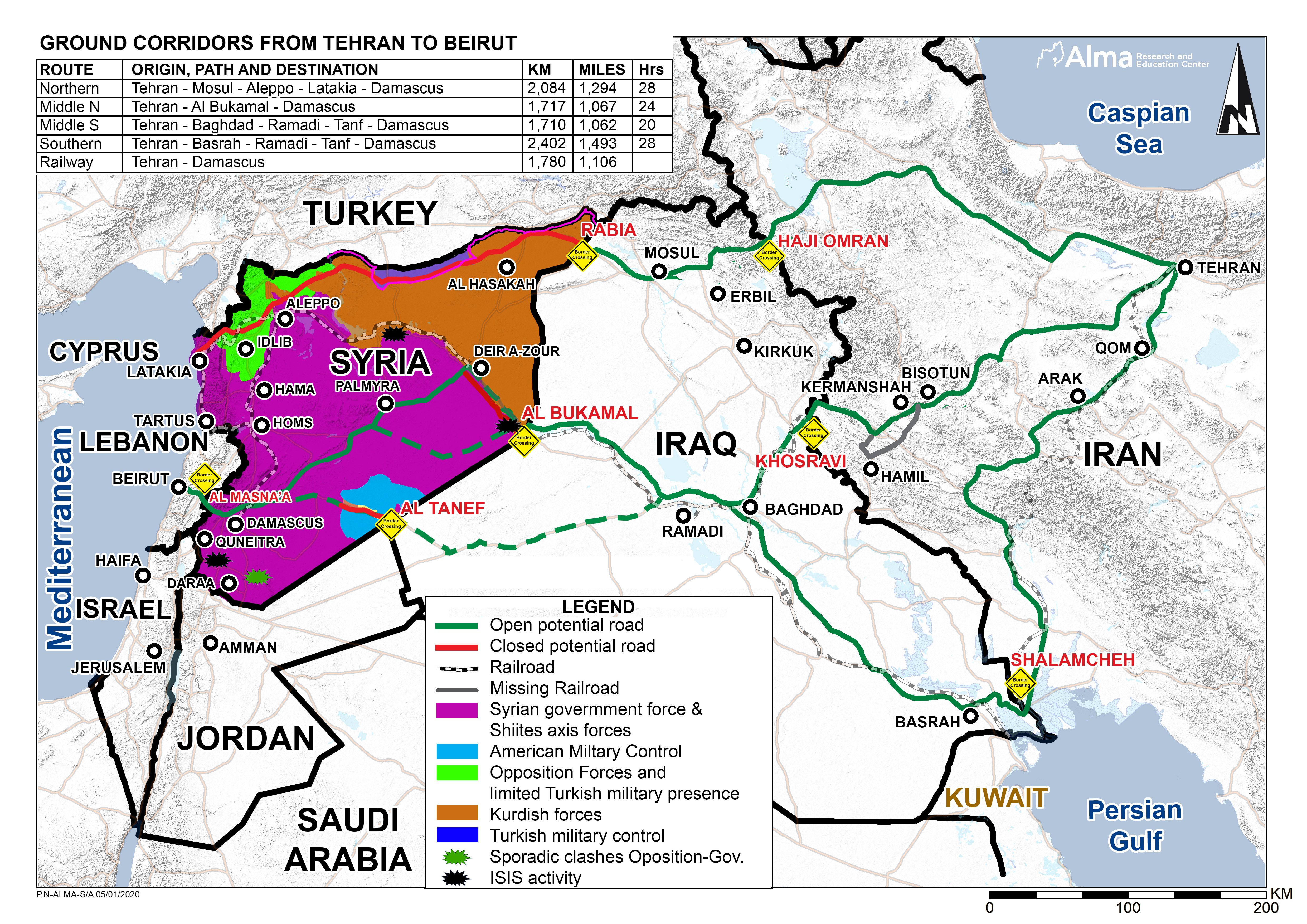
Given these actions, Israel continues to increase its efforts in strengthening trade ties and establishing potential trade routes. Jordan has welcomed the latest measures towards broader cooperation due to the stability and the economic benefits they create. Jordan hopes to be a central pillar in strengthening Israel’s common interests with the Gulf states and expects the cooperation to help increase vital stability for the region. In July 2021, the US closed four facilities based in Qatar, transferring them to Jordan. This move reinforces the message that Jordan will continue to be a strategic asset for the United States.
The common interest between Jordan and Israel is in stabilizing the Hashemite Kingdom, which continues to deal with over one million refugees (according to UN estimates) who have fled Syria, Iraq, and Yemen, countries with deep Iranian involvement. Accordingly, as Israel and Jordan’s security coordination continues to be firm, the situation will also enable greater commercial cooperation.
Benefiting from the relations with Jordan, an agreement strengthening the alliance with the Gulf states was recently signed. The agreement grants the establishment of a large solar energy facility in Jordan with the participation of the UAE. The energy produced will be sold to Israel, thus contributing to Israel’s goal of diversifying its energy sources. The agreement will be instrumental to Israel’s energy security due to concerns regarding potential disruptions in its energy supply. The facility is expected to produce 2% of Israel’s energy by 2030, and in return, Israel has pledged to supply Jordan with desalinated water from the Mediterranean coast.
Emirati Crown Prince Mohammed bin Zayed recognizes these commercial moves as a long-term strategic investment that will assist the region. Recently, a deal was approved to sell part of the Israeli gas reservoir “Tamar” located in the Mediterranean Sea to “Mubadala Petroleum,” owned by the Abu Dhabi government. The UAE’s decision to invest in the Israeli gas field is more than a desire to expand its holdings in gas fields. At this time, another construction project of EastMed underwater pipelines is underway, its purpose is to supply gas to markets in southern Europe deriving from Israeli gas fields. This project that was launched eight years ago is still far from completion, and the decision on whether to accelerate the project’s development is expected to be made in 2022. If implemented, the project is expected to further deepen Israel’s importance in transporting energy in the Mediterranean basin.
These moves accompany additional decisions acting against Iran’s influence. Among the additional decisions, there are a series of agreements signed between Emirati companies and Syria, such as the agreement to build a solar power plant near Damascus at the cost of $300 million. In October 2021, Jordan agreed to supply electricity to Lebanon through Syria, and similarly, Egypt announced that it would supply natural gas to Lebanon via Jordan and Syria. Both Egypt and Jordan import gas from Israel, while Jordan uses the Arab gas pipeline to transport it throughout Jordan. Syria and Lebanon may have political difficulties in being part of a larger regional gas infrastructure that includes Israeli gas. Jordan’s role will allow the expansion of the energy and electricity exports in order to integrate into economic and infrastructure reconstruction projects in Syria, emphasizing on southern Syria.
One indication of Jordan’s ambitions in Syria was the visit of the Syrian defense minister to Jordan. The purpose of his visit was to discuss border security and the situation in the Daraa area with Jordan’s military leaders and Syria’s ability to secure the Arab gas pipeline on its territory. Jordan also announced the resumption of Royal Jordanian direct flights to Damascus and reopened the Jaber border crossing, which was closed by the Jordanians in 2015. The above indicate long-term intentions in curbing Iran’s domination attempts in the region.
The main and common concern of the moderate countries is the growing dependence on Iran. A good example of this is Iraq, which depends on Iran for its electricity and water supply. Over the past decade, the amount of water reaching the Tigris River in Iraq from the Iranian side has decreased immensely. Besides Iraq’s increased electricity imports from Iran and the power outages it has experienced, Iraq also faces a sharp decline in the flow of gas reached through the two gas pipelines from Iran.
The remaining challenge is to ensure that the developing ties can withstand regional geopolitical developments. The leeway of the leadership in Israel, Jordan, and the Gulf states in the face of unexpected events places the importance of preserving a regional alliance. This is one of the reasons why Israel and the UAE invest heavily in creating joint research centers for renewable energy and are now expanding it into the fields of technology and research.
Some research is done with official American encouragement, and some is done independently. Following the last visit of Israeli President, Herzog, to the Emirates at the end of January, it was reported that the Crown Prince of the United Arab Emirates, Mohammed bin Zayed, had decided to promote the $10 billion investment package in Israeli companies that he had promised in the normalization agreements.
The UAE’s largest sovereign funds will share the investments, including the ADIA fund and the Mubadala fund, although the first fund to enter the Israeli market is the Abu Dhabi Growth fund of the ADQ Group. This fund plans to invest $200 million in Israeli companies in 2022 and a similar amount each year over 10 years.
The decision to establish a joint Israeli and Emirati fund for mutual investments in the high-tech sector will jump-start the countries’ common interests and give them the necessary status to stabilize the Middle East. The inherent potential in the continued cooperation and the broad changes that are taking place in the countries of the region embodies the importance of innovations in the energy sectors in countries that may need them. These joint collaborations will help further enhance cooperation between the Gulf states and Israel while preventing the Iranians from establishing themselves under a civilian guise.
